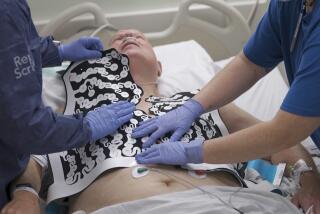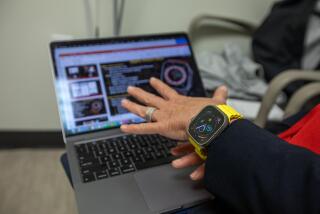Correcting an Irregular Heartbeat
- Share via
WASHINGTON — Despite Vice President Dick Cheney’s efforts to downplay his latest heart trouble, an irregular heartbeat, which is harmless in otherwise healthy people, can provoke death in those with underlying heart disease.
Known as arrhythmia, it is triggered by a disruption in the heart’s electrical conduction system, which coordinates the pumping action, or contractions, of the organ as it sends blood through the body.
Arrhythmia can result in heartbeats that are too fast, too slow or too erratic. Millions of people worldwide experience occasional arrhythmia, which some say feels like the heart is doing flip-flops in the chest.
A heartbeat that even briefly exceeds 100 beats a minute, such as that diagnosed in Cheney, can produce palpitations, dizziness, lightheadedness and fainting. Cheney said Friday that he has not experienced any symptoms.
Dr. Douglas Zipes, president of the American College of Cardiology--who was consulted Thursday by Cheney’s cardiologist, Dr. Jonathan Samuel Reiner--said that Cheney’s lack of symptoms indicate that the problem is not serious now.
With most episodes of arrhythmia, Zipes said, “if it’s you or me, we shrug them off and go about our business. But in a person with heart disease, they may be a predictor of a future, more serious heart rhythm problem. He’s having asymptomatic, short episodes, which are not a problem by themselves--but may represent a risk for a severe episode in future.”
A severe episode could prove lethal. “It’s one of the risk factors for sudden death,” said Dr. Lameh Fananapazir, chief of the clinical electrophysiology and inherited heart diseases section of the National Heart, Lung and Blood Institute.
The heart contracts, or beats, as electrical impulses move through it. This normally occurs 60 to 100 times a minute. The atriums (the two smaller upper chambers of the heart) contract a split-second before the ventricles (the lower two chambers). This lets them empty their blood into the ventricles before the ventricles contract.
Cheney’s rapid heartbeat originates in the ventricles, the site of his heart damage, where it can lead to a life-threatening condition known as ventricular fibrillation. The lower chambers of the heart quiver and the heart can’t pump any blood at all. Without immediate medical help, they collapse and death can follow.
Cheney’s initial test two weeks ago, while he was at home over a weekend, involved being hooked up to a portable device, known as a Holter monitor. The device tracked his heartbeat and detected the irregularities.
Today he will undergo an electrophysiology study at George Washington University Medical Center, his third trip there since suffering his fourth heart attack in November, to determine the extent of his heart rhythm problems and their potential to become more serious.
If his physicians determine that there is a danger, they will implant what Cheney called a “pacemaker-plus” under his skin to regulate his heartbeat.
After inserting a small wire into Cheney’s chest, “they will stress his heart electrically with pacemaker stimuli to see whether his heart is predisposed to developing an abnormal heart rhythm problem,” Zipes said.
If that turns out to be the case, Cheney’s physicians will implant a cardioverter defibrillator, which will monitor his heartbeat and act if the beats are either too fast or too slow.
“If the heartbeat gets too slow, it will function like an ordinary pacemaker,” Zipes said. “If it gets too fast, it will deliver an electrical shock to restore it back to normal--just like the paddles you’ve seen applied to the chest.
“It’s like having an emergency room implanted in your chest.”
Fananapazir added, “It doesn’t entirely eliminate the risk of sudden death, but it reduces it dramatically.”
Other factors that can contribute to arrhythmia include anxiety and stress, alcohol, caffeine and cigarettes.
Cheney quit smoking after a previous heart attack.






